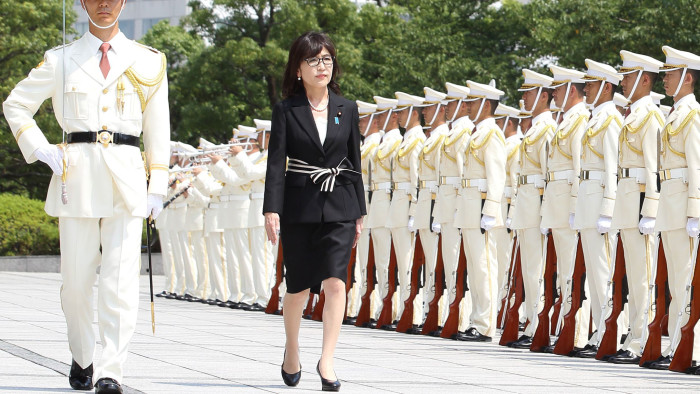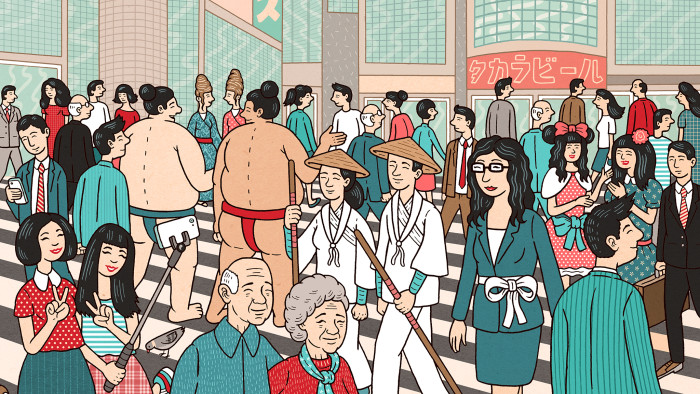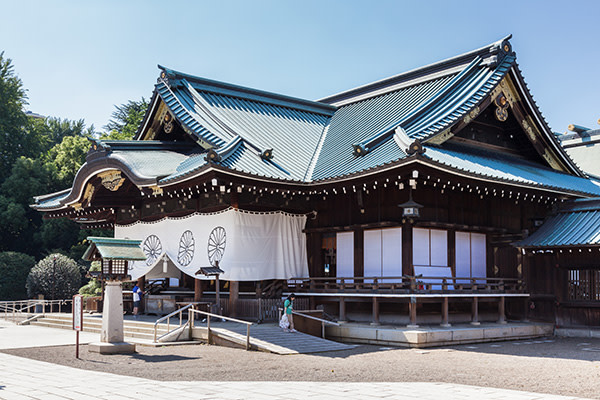Tomoni Inada: Japan’s prime minister in waiting

Simply sign up to the Life & Arts myFT Digest -- delivered directly to your inbox.
Few weeks into her job as Japan’s defence minister, Tomomi Inada paid a visit to the country’s naval base in Djibouti in the Horn of Africa. If she had followed her normal routine, Inada would have been thousands of miles away in Tokyo, at the Yasukuni shrine near the Imperial Palace. This traditional Shinto temple honours Japan’s war dead. Inada’s uncle died while training to be a kamikaze pilot three months before the second world war ended, and every year Inada visits on August 15, the anniversary of Japan’s defeat.
To sacrifice her pilgrimage this year was a calculated political decision. Inada is not just defence minister but prime minister in waiting, according to many commentators in Japan. The memorial is viewed by much of Asia as a symbol of Japan’s past militarism and, among the names of the fallen, it also enshrines 14 Class A war criminals. Inada knew that going to Yasukuni would be diplomatic dynamite.
For this former lawyer, the shrine is also where her political career began. In 2005 she was leading a court case related to the 1937 Nanking massacre when PM Shinzo Abe, then acting secretary-general of the ruling Liberal Democratic party, encouraged her to run in the lower house election. “I felt that it was perhaps the will of the souls of more than 2.46 million war dead that I was asked to run in the election while I was at Yasukuni shrine on August 15,” Inada later wrote.
Political analysts say Inada’s ascent has also been helped by the rise of female leaders across the globe, from US presidential candidate Hillary Clinton and British prime minister Theresa May to Tsai Ing-wen, Taiwan’s first female president. “In line with broader global developments, there is an emerging momentum in Japan for a female prime minister,” says Masato Kamikubo, a politics expert at Ritsumeikan University.
Inada is part of Abe’s “womenomics” programme to redress the country’s longstanding problem of gender inequality. One aim is to raise the female employment rate from 68 per cent to 73 per cent by 2020, obliging large companies to publish targets for ratios of female managers. Tokyo has produced its first female governor and the leading candidate to head the country’s main opposition party is also a woman. Yet progress has been slow, with women accounting for just three out of 20 cabinet positions. Inada, who is Japan’s second female defence minister, is the most senior of the three. “The selection of a female minister is Abe’s message to the public, and that has worked to Ms Inada’s advantage,” says Shinichi Nishikawa, a political science professor at Meiji University.
Japan special

The art of growing old
Ageing gracefully in Misaki
A pilgrim’s progress
The arduous Shikoku pilgrimage
Treasures of the Tang trail
Nara and Kyoto’s Chinese visitors
In the sumo ring
How sumo wrestlers train — and eat
Cornucopia utopia
Japan’s 24-hour convenience store
Tea, trains and Bowie
Must-do dates for the diary
Q&A: Quintessentially Japanese
What frequent visitors like most about Japan
Inada’s rise to power has involved stints as the LDP’s policy chief and as minister for administrative reform. With no family ties to Japan’s political establishment, Inada has substituted her lack of political heritage with a powerful endorsement from Abe. At a symposium in February, he described his protégée as “a very strong candidate” to become PM. Inada herself has been less forthcoming, although she has remarked that the premiership is “a goal any politician would aim for”.
. . .
Until her mid-forties, Inada showed little interest in politics. Born in 1959 in Fukui prefecture, central Japan, she was raised by her father Yasuo Tsubakihara, a strict, nationalistic high-school teacher who was an active participant in political demonstrations until he fell ill a few years ago.
“She is my only child. I wanted to raise a son, so, in some ways, she was raised like a boy,” Tsubakihara said in 2010. He did not give his daughter pocket money as a child, fearing she would become “obsessed” with wealth.
Her husband, Ryuji Inada, whom she met during a legal apprenticeship in the early 1980s, recalls the start of his wife’s remarkable ascent. “It was extremely tough,” he says of that first election campaign in 2005, which she won by a razor-thin margin of 373 votes. There was family life to balance. “Every weekend, she went to Fukui [her electoral district] and she also had to attend school events for our kids.”
In his office in central Osaka, the softly spoken lawyer says his wife realised that politics would be the quickest route to the changes she believed in. “If you really want to change things, you have to be close to where power lies,” he says. “It didn’t take long for her to reach a decision [to run for office].”
Observers suggest it is unlikely Inada would have risen to prominence, either as lawyer or politician, were it not for her outspoken views on Japan’s history. She has questioned the legitimacy of the Tokyo tribunal that convicted Japanese leaders of war crimes, elements of the infamous Nanking massacre and the degree of coercion in supplying wartime brothels. She has also said Japan should consider arming itself with nuclear weapons. Her appointment as defence minister has disturbed not only China and South Korea, but even the US.

“If you look at what Ms Inada has said and written in the past, she is far to the right, even more so than Mr Abe,” says Nishikawa at Meiji University. “Putting aside whether such a person can actually become prime minister, she is undoubtedly a key person in Japanese politics.”
In Inada’s book about the court case she fought relating to the Nanking massacre, she says she started questioning history as taught in Japanese schools after watching a documentary about the Tokyo tribunal. “I was appalled to learn that what we had been taught in school textbooks was a one-sided view of history,” she wrote, describing the tribunal as “unjust”. Mr Inada recalls that his wife, then in her thirties, watched the film at midnight. “She is the kind of person who suddenly asks why. She is interested in getting the facts straight, like how many people died.”
While raising her two small children, she sent out letters to Nobukatsu Fujioka, a rightwing academic and a founding member of the Japanese Society for History Textbook Reform, and joined his study group. During her free time, she wrote letters to newspapers and magazines that raised questions about Japanese education. The turning point came with the 2003 court case, in which she represented the families of two Japanese military officers implicated in the 1937 Nanking massacre. Inada lost the case but caught Abe’s attention, among others. “I came to Nagatacho [Tokyo’s version of Capitol Hill] to protect the nation’s honour,” she says in the closing chapter of her book.
. . .
Inada became increasingly independent as she grew older, defying her father by studying law at Waseda University in Tokyo instead of at a local college near Kyoto, where she spent most of her childhood. She also did not heed her father’s advice when she decided to marry Ryuji, a fellow Waseda alumni. But she encountered the strongest resistance when she entered politics. “I was angry and I cried. I even declared that I would cut off ties with my daughter,” Tsubakihara said in 2010. “But she’s stubborn like me.”
Inada is known as an accomplished debater but she herself has admitted that she was not always a good public speaker. She becomes very nervous in front of crowds and prepares thoroughly before any speech, according to Takayuki Terasawa, her local secretary in Fukui. “Her image is very different from reality,” Terasawa says, speaking at Inada’s tiny electoral office near a local station. “People here know how nervous she becomes. I don’t think many envisage her as Joan of Arc.”
There is also, perhaps, a discrepancy between her reputation as a hardline nationalist and her true opinions. “Ms Inada’s appointment coincides with a drastic transition in Japan’s security policy, but it’s hard to know whether her [rightwing] ideology is genuine or whether she’s conforming to others,” says Tsuyoshi Mifune, a politics professor at Chuo University.

For his own part, Abe has cited growing Chinese military activities and North Korea’s missile development to win support for his efforts to beef up Japan’s military strength and reinterpret the pacifist constitution.

In Inada’s electoral district in Fukui, locals have hardly heard her talk about her beliefs. Her voters are more concerned about job losses, depopulation and succession challenges. Home to the largest number of nuclear plants in Japan, the prefecture of Fukui is also one of the world’s biggest manufacturers of glasses, an industry that has suffered from the rise of cheaper Chinese competition. To promote locally produced brands, Inada wears more than 20 types of fashion glasses, as well as miniskirts and black fishnet stockings of the same brand worn by Lady Gaga. Regardless of her good intentions, her quirky fashion sense has often been a target of ridicule on social media.
At home, Inada is said to be a “tiger mom” to her son and daughter, according to Katsuhiko Takaike, a rightwing lawyer who has worked with Inada in court cases questioning historical facts related to Japan’s wartime aggression. Before entering politics, Inada asked for Takaike’s help in enrolling her son in one of Tokyo’s most prestigious high schools, even though the family lived in Osaka at the time. “She’s very passionate about her children’s education,” Takaike says.
Outside work, her husband says she likes comedies and plays Pokémon Go. “Once she finds an interest, she becomes engrossed,” he says, remembering how she built a playground slide from scratch for her children one day.
Inada’s revisionist views mean she remains a polarising figure at a time when Sino-Japanese relations are already strained. One month into her role, Inada has dodged sensitive topics by mostly declining to comment on historical views. That has frustrated some of her supporters on the right who had expected her to take a more hardline stance. Her Yasukuni strategy is similar to the approach taken by Abe, who has avoided visiting the shrine since December 2013.
She has also tackled issues such as LGBT rights that are not always aligned with her conservative views. Ryuji Inada says: “I don’t think she has such a radical rightwing view that needs to be buried. She is being unfairly labelled. If you meet her in person, you will know what kind of person she really is.”
In recent years, aspiring Japanese female politicians thrust into the spotlight have often stumbled over political funding scandals and clashes with bureaucrats who run the ministries. “She has the flexibility and the realistic mindset of a politician, but one weakness is that she has never experienced failure,” says Ritsumeikan University’s Masato Kamikubo. Even Inada’s closest supporters are uneasy about the speed of her promotion.
Perhaps Inada herself is the most surprised by her advancement. “I’ve actually never heard her say that she wants to become a prime minister,” says Terasawa. “I think she’s feeling how steep the mountain is, now that she’s started to climb higher.”
Kana Inagaki is an FT Tokyo correspondent
Photographs: Rex/Getty/Lionel Guericolas/Visual Press Agency
Comments